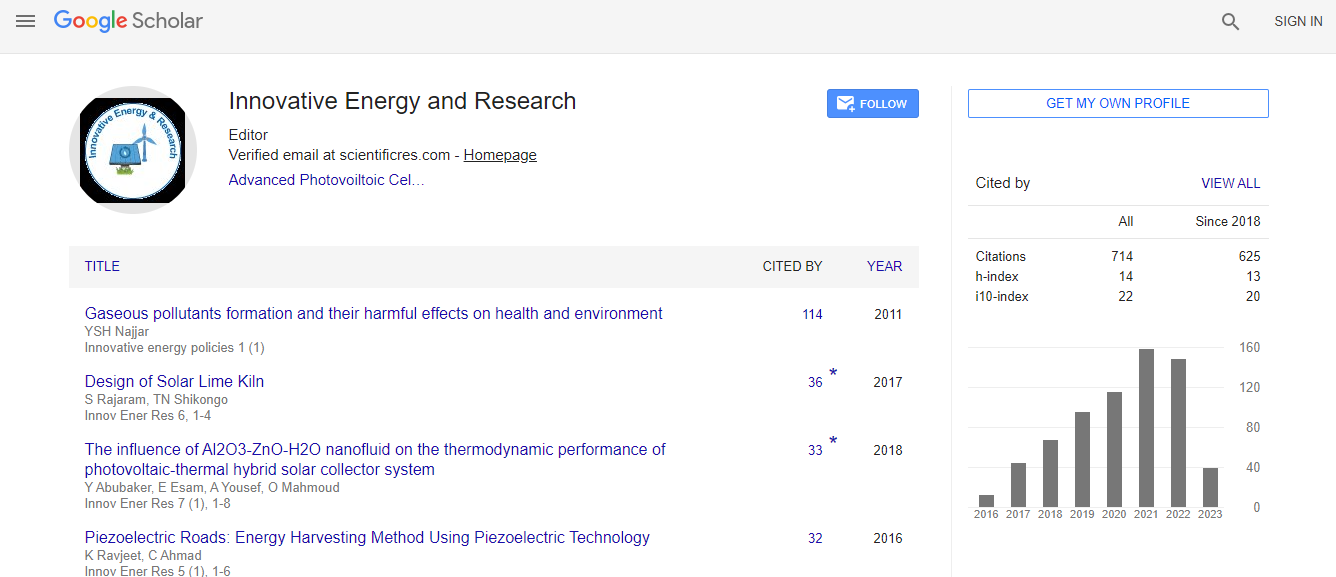Our Group organises 3000+ Global Conferenceseries Events every year across USA, Europe & Asia with support from 1000 more scientific Societies and Publishes 700+ Open Access Journals which contains over 50000 eminent personalities, reputed scientists as editorial board members.
Open Access Journals gaining more Readers and Citations
700 Journals and 15,000,000 Readers Each Journal is getting 25,000+ Readers
Google Scholar citation report
Citations : 712
Innovative Energy & Research received 712 citations as per Google Scholar report
Innovative Energy & Research peer review process verified at publons
Indexed In
- Google Scholar
- Open J Gate
- Genamics JournalSeek
- RefSeek
- Hamdard University
- EBSCO A-Z
- Publons
- Euro Pub
- ICMJE
Useful Links
Recommended Journals
Related Subjects
Share This Page
Controlled selectivity via kinetic resolution with transient operation
Joint Event on 2nd International Conference on Renewable Energy and Resources & Energy Materials and Fuel Cell Research
Javier Fernandez-Garcia, V Matveeva, Cherkasov, EM Sulman and EV Rebrov
University of Leeds, United KingdomUniversity of Warwick, United KingdomTver State Technical University, Russia
ScientificTracks Abstracts: Innov Ener Res
Abstract
A transient operation has been previously considered in many industrial processes where either heat recovery or production rate can be considerably improved as compared to steady-state operation. The effect of periodic temperature oscillations has been studied in the hydrogenation and isomerization of D-glucose over a supported Ru-catalyst in a micro trickle bed reactor. It was found that the preferred reaction pathway depends on the frequency of periodic temperature oscillations. The catalyst based on ruthenium nanoparticle supported over hypercrosslinked polystyrene was tested in the reaction of hydrogenation/isomerization of glucose and maltose under radiofrequency heating in a continuous flow fixed bed reactor. The catalytic activity and selectivity were investigated under the steady-state and transient operation reactor modes. The transient operation of periodic temperature oscillations with a low amplitude of 14 oC showed a dramatic change in the reaction pathway altering the preferential reaction from hydrogenation to isomerization for both substrates studied. The period of temperature oscillations affects the hydrogen coverage which can determine the main reaction which takes place. The data shows that the transient operation mode could have a high impact on biorefinery because fructose is one of the main feedstocks for 5-hydroxymethylfurfural and other valuable compounds in the field. Moreover, the work demonstrates that a concept of a superior product selectivity achieved by introducing transient operation, which can likely be applied to other reaction classes and processes.Biography
Dr Javier Fernandez-Garcia studied his bachelor (2002-2007) and master’s degree (2010-2011) in Spain. He worked in industry from 2007 to 2014 in companies such as Saint-Gobain, XSTRATA, Biogas Fuel Cell and HUNOSA. He completed his PhD at University of Oviedo (2011-2014). After that he worked as a Research Fellow at University of Warwick from 2014 to 2016. Then he developed research activities in Stoli Catalysts Ltd (Spin-out company) and he was finally appointed as Lecturer in Chemical Engineering at University of Leeds in 2017.
E-mail: J.FernandezGarcia@leeds.ac.uk

 Spanish
Spanish  Chinese
Chinese  Russian
Russian  German
German  French
French  Japanese
Japanese  Portuguese
Portuguese  Hindi
Hindi 
